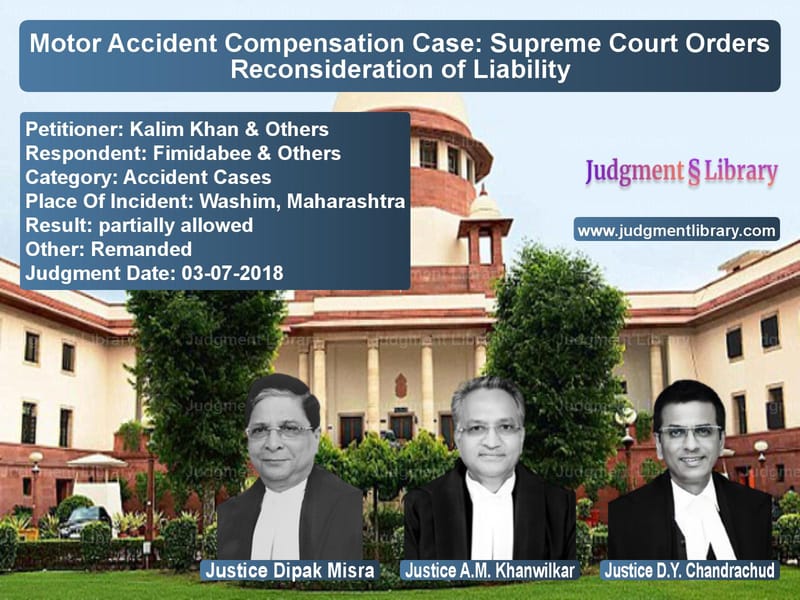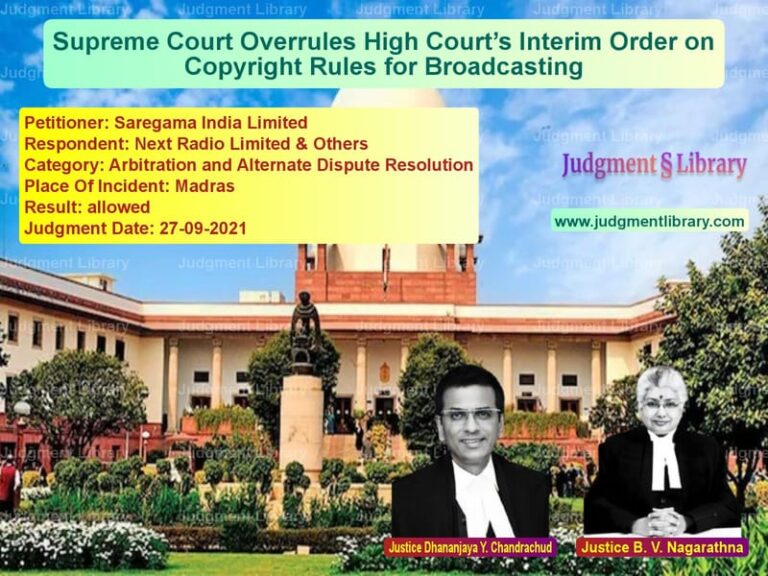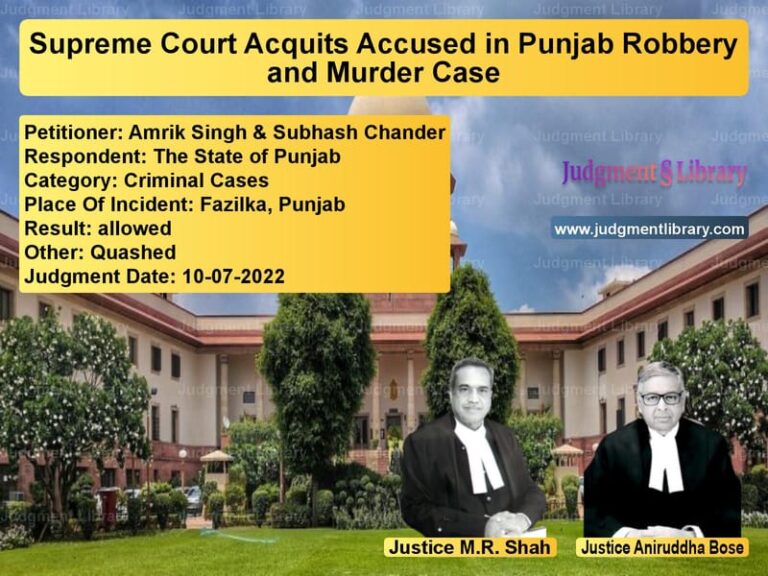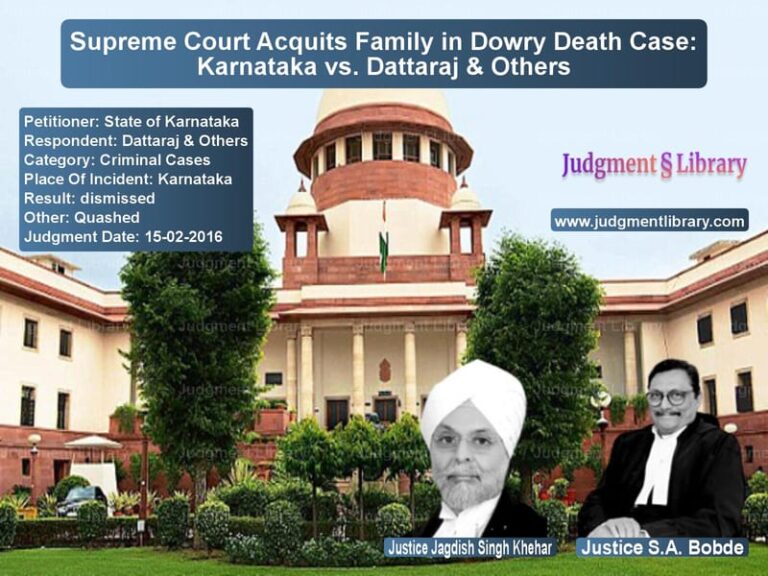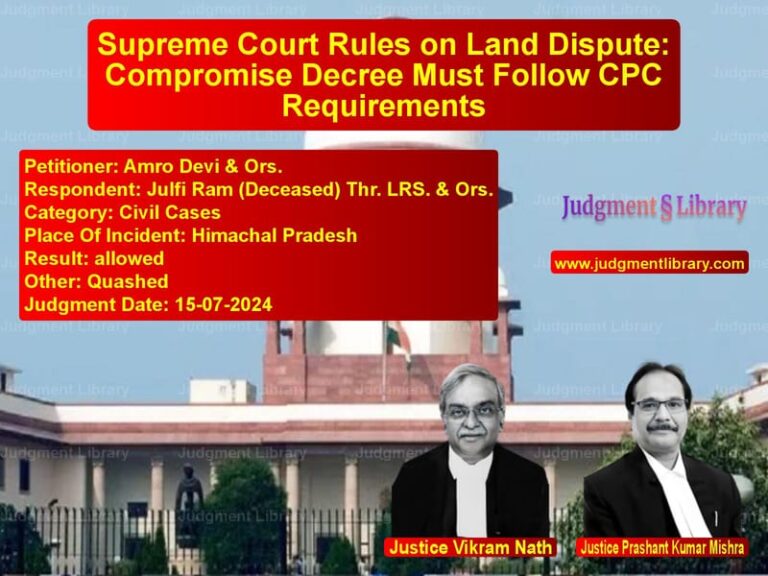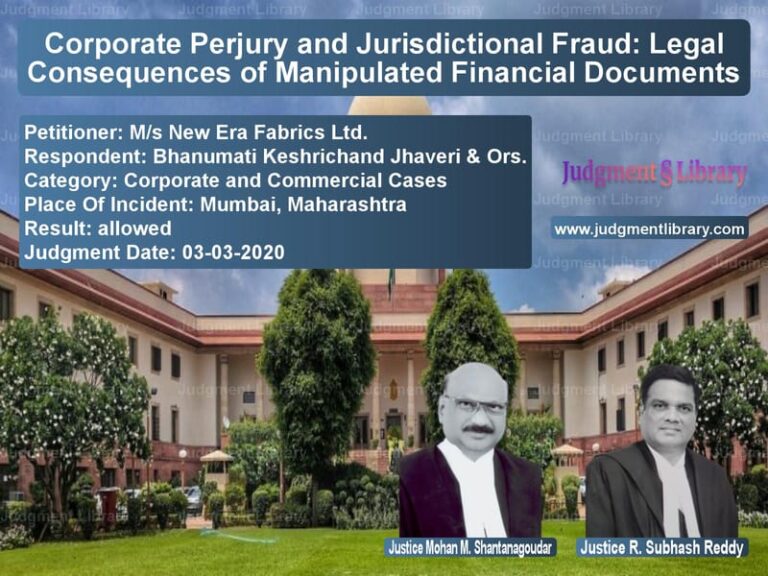Motor Accident Compensation Case: Supreme Court Orders Reconsideration of Liability
The case of Kalim Khan & Others v. Fimidabee & Others revolves around a compensation claim under Section 166 of the Motor Vehicles Act, 1988. The Supreme Court was called to determine whether the accident in question, which resulted in the death of an individual due to a blasting operation powered by a tractor’s battery, could be classified as arising from the ‘use of a motor vehicle’ under the Act. The ruling has significant implications for insurance claims and the liability of vehicle owners in motor accident cases.
Background of the Case
The case was filed by the legal representatives of Firoz, an Assistant Teacher in an Urdu Primary School, who died due to injuries sustained from an explosion while walking home. The petitioners contended that the explosion resulted from a blasting operation carried out using a tractor, which was connected to the detonating device. The explosion sent a stone flying, which struck the deceased, leading to fatal injuries.
The petitioners filed a compensation claim of Rs. 15 lakhs under the Motor Vehicles Act, 1988, arguing that the tractor’s involvement made it a motor accident. The owner of the tractor and the insurance company challenged this claim, arguing that the vehicle was not in motion and was not being used for transportation at the time of the accident.
Arguments by the Parties
Petitioners’ Arguments
- The tractor supplied power to the blasting machine, making it an integral part of the incident.
- The explosion would not have occurred without the vehicle’s battery being connected to the detonator.
- The accident should be treated as arising from the use of a motor vehicle, thereby making the insurance company liable under the Motor Vehicles Act.
- The trial court had correctly ruled in their favor, considering the role of the tractor.
Respondents’ Arguments
- The insurance company argued that the tractor was insured only for agricultural purposes and was not intended to be used for a blasting operation.
- The High Court ruled that the explosion was not directly linked to the vehicle’s operation, rejecting the claim.
- The insurer stated that since the tractor was not moving and was not involved in transportation, it could not be classified as a motor vehicle accident.
- The insurance company also argued that even if liability were established, it could not be held responsible due to a breach of policy conditions.
Legal Issues Considered by the Supreme Court
The Supreme Court analyzed the case with respect to previous rulings on similar matters, particularly focusing on the following legal aspects:
- Whether the incident falls under the definition of ‘use of motor vehicle’ as per Section 165 of the Motor Vehicles Act.
- Whether the insurance company was liable when the vehicle was not in motion at the time of the incident.
- The interpretation of ‘use of motor vehicle’ in past cases, including Shivaji Dayanu Patil v. Vatschala Uttam More and Union of India v. United India Insurance Co.
Supreme Court’s Observations
The Supreme Court made several important observations while deciding the case:
- The High Court had erred in concluding that the vehicle was not involved in the accident.
- The Tribunal had rightly observed that the tractor’s battery was an essential component in causing the explosion.
- The use of a vehicle should not be restricted only to its motion but must include all functions it serves.
- Past judgments supported a broader interpretation of ‘use of a motor vehicle’ under the Motor Vehicles Act.
Final Judgment
The Supreme Court set aside the High Court’s order and remanded the case back for reconsideration on the issue of liability. The Court issued the following directives:
- The High Court must reassess the case to determine whether the insurer or the vehicle owner should bear liability.
- The insurance company must pay the compensation awarded by the Tribunal while awaiting a final decision.
- If the insurance company is found not liable, it can recover the amount from the vehicle owner.
The Supreme Court’s decision reaffirmed that cases involving indirect vehicle usage must be analyzed thoroughly before denying compensation. This ruling ensures that compensation claims are not dismissed merely due to restrictive interpretations of ‘use of a motor vehicle’ under the Act.
Petitioner Name: Kalim Khan & Others.Respondent Name: Fimidabee & Others.Judgment By: Justice Dipak Misra, Justice A.M. Khanwilkar, Justice D.Y. Chandrachud.Place Of Incident: Washim, Maharashtra.Judgment Date: 03-07-2018.
Don’t miss out on the full details! Download the complete judgment in PDF format below and gain valuable insights instantly!
Download Judgment: Kalim Khan & Others vs Fimidabee & Others Supreme Court of India Judgment Dated 03-07-2018.pdf
Direct Downlaod Judgment: Direct downlaod this Judgment
See all petitions in Road Accident Cases
See all petitions in Compensation Disputes
See all petitions in Motor Vehicle Act
See all petitions in Judgment by Dipak Misra
See all petitions in Judgment by A M Khanwilkar
See all petitions in Judgment by Dhananjaya Y Chandrachud
See all petitions in partially allowed
See all petitions in Remanded
See all petitions in supreme court of India judgments July 2018
See all petitions in 2018 judgments
See all posts in Accident Cases Category
See all allowed petitions in Accident Cases Category
See all Dismissed petitions in Accident Cases Category
See all partially allowed petitions in Accident Cases Category

